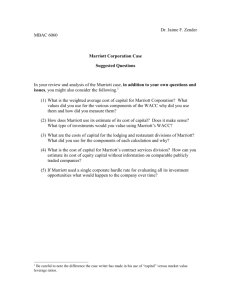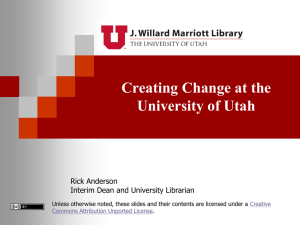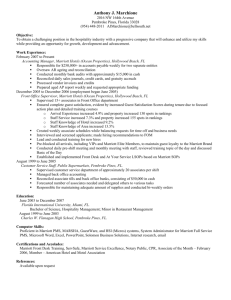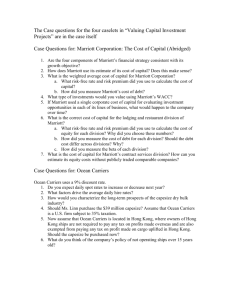t h e m a r r i... s t o r y
advertisement
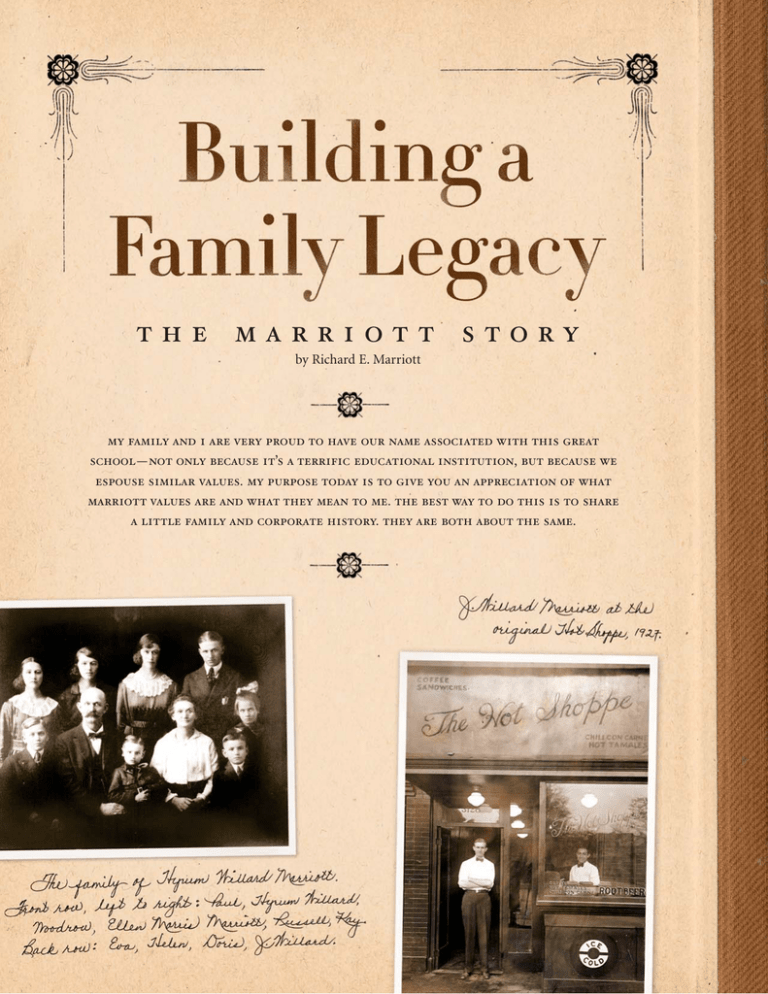
the marriott story by Richard E. Marriott my family and i are very proud to have our name associated with this great school—not only because it’s a terrific educational institution, but because we espouse similar values. my purpose today is to give you an appreciation of what marriott values are and what they mean to me. the best way to do this is to share a little family and corporate history. they are both about the same. The Marriott companies most people know and recognize today are: Marriott International, of which my brother, Bill, is the CEO and chairman; and Host Marriott, of which I am chairman. Both companies came from the original Marriott Corporation, which began as Hot Shoppes, Inc. My father, J. Willard Marriott, was the founder of it all. He was frequently asked, “What is the secret to your success?” He invariably responded that three elements were integral to his success: (1) being born right; (2) developing good habits; and (3) marrying right. T being born right My father had two things going for him at birth: he was born in the United States, and he had good genes. He was blessed to live in one of the few countries where, if you work hard and make reasonably intelligent decisions, you can become successful. I serve on the board of the National Restaurant Association with about ninety-five people who are very successful and well known in the business world. Almost every one of them started working as a dishwasher, table busser, or server in a restaurant and then worked up to management and often ownership. This great country in which we live gives each of us this opportunity. Secondly, my father had good genes, and a lot of those genes came from his grandmother, Elizabeth Stewart. Elizabeth was born in Liverpool, England. She and her brother, William, were converted to The Church of Jesus Christ of Latter-day Saints. Their family was very poor and gave little support to Elizabeth’s and William’s decision to join the Church and make the long, arduous trip to Zion, which was a fairly heavy expense in 1850. Elizabeth had one possession of value—a beautiful shawl she received from her mother—which she sold for enough money to book passage on a ship sailing from Liverpool to St. Louis, Missouri. After arriving in St. Louis, William used his last few dollars to pay for his passage on a wagon train to Salt Lake City. Elizabeth had nothing left, so she worked for two years as a housekeeper to earn enough money to join a wagon train. Of course, in those days when you joined a wagon train, you didn’t actually ride in a wagon—you walked alongside it. Unfortunately, she had only one pair of shoes. She wrote in her diary, “I would not want to walk down the streets of Salt Lake City in worn-out shoes,” so she took those shoes, put them in her bag and walked barefoot so she would have good shoes when she got to Salt Lake City. She was a strong-willed woman! After her trek across the plains, Elizabeth lived with her brother in Kaysville, Utah. Shortly after she arrived there, she was standing in the doorway of his home, looking out across a field, and saw a giant of a man on horseback coming toward her. She said he was not very handsome, but the Spirit whispered to her, “This is going to be your husband.” I don’t think she was especially happy to hear that. His name was John Marriott, and about three days later he approached her and said, “I’ve got the feeling you and I are to be married,” and so they were wed shortly thereafter. One of the products of that marriage was Hyrum Willard Marriott, my grandfather. developing good habits My father, J. Willard, grew up on his father’s farm, just west of Ogden, in the small town of Marriott, Utah, which was founded by his grandfather, John Marriott. As a young boy, he quickly learned how to work hard and take responsibility. He and his seven brothers and sisters had to take care of the crops and the livestock. As the eldest son, my dad had primary responsibility for the sheep and cattle. He spent so much of his time during his teen years tending them on the farm and herding them on the winter 2003 5 ranges of Nevada and Utah that he never graduated from high school. He was called on a mission at age nineteen, and that provided him the welcome opportunity to leave the farm and spend two years on the East Coast, preaching the gospel from Washington, D.C., to Maine. When my dad returned to Utah, he was able to talk his way into being accepted at Weber College without having a high school diploma. His second year of college is exemplary of the kind of worker he was. He was the salesman and writer for the newspaper, the manager and stock boy for the bookstore, an English teacher, and senior class president. After graduating from Weber, my father transferred to the University of Utah and worked in a food-catering business with Franklin D. Richards, who was to be one of his lifelong friends. During summers at the University of Utah, he earned his living selling black wool long underwear produced by a Utah woolen mill. Dad would go to the Northwest logging camps and sell this underwear for $20 a pair. That was a lot of money back then, so he developed a special selling strategy. He would find two meanlooking lumberjacks and challenge them saying: “Each of you take a leg of this pair of underwear. If you can pull this underwear apart, I’ll give you a free pair. If you can’t, you’ve got to buy it.” The loggers would then have a tug-of-war but could never tear the underwear apart. Dad earned more than $2,000 in commissions during a single summer and was the most productive salesman in the company. marrying right In addition to succeeding as a salesman, my father also succeeded in finding the right woman to marry. At the University of Utah, he met a young lady named Alice Sheets. She was eighteen years old and in her junior year. On one of their first dates, he took her to a little restaurant in the center of Salt Lake City. It was a small orange and black box building selling one item—A&W root beer. My father was extremely impressed—not because he liked root beer, but because they had a line of people a block long waiting to buy this product. He was so excited that he jumped on a train for Sacramento, California to talk to Roy Allen, the “A” in A&W. Roy sold him a license to sell A&W root beer in the 6 MARRIOTT Washington, D.C., area. Dad chose this area because he’d been there on his mission and knew how hot and miserable it was in the summer. He proposed to Alice and told her he would be back to marry her when she graduated. He left for Washington to make all the root beer stand arrangements and returned to Utah in May 1927 for the wedding. On the day they were to be married in the Salt Lake Temple, my father didn’t show up when the ceremony was supposed to start. He was trying to get his commissions from the woolen mills. He arrived at the wedding two-and-a-half hours late, with no money. He asked my mother, “Do you still want to marry me?” She said, “yes,” of course. His mother-in-law had the presence of mind to cancel the wedding reception and give Dad the $200 they were going to spend for the reception. With that money, mom and dad jumped into his Model T Ford and started their two-week drive to Washington, D.C. My mother was a tremendous partner to my father. She kept the books for their new nine-seat restaurant, which opened up the day Lindbergh flew across the Atlantic, 20 May 1927. Every night she would take the nickels, which were covered in root beer syrup, and wash them in the kitchen sink (the bank wouldn’t accept sticky nickels). She’d then put the clean coins into a paper bag and walk down to the bank around midnight to make the deposit of the day’s revenue. She understood what it took to run a restaurant, and she supported my dad throughout his career because she loved him and appreciated the work he was doing. I learned a lot of important lessons from my parents, many of which are the same ones you’ll be learning not only in the business world, but also at the Marriott School. success is never final Change is what puts life in your business and in your life. The customer needs change constantly, and your business and you have to change to meet those needs. When my folks opened their root beer stand, they had one product: ice-cold root beer. That worked great from May through September. October rolled around and it got cold and rainy in Washington, D.C. Nobody wanted ice-cold root beer. The customers my father still had said, “Hey, you better get something hot in here to eat or you’re going to be out of business.” Fortunately, my folks lived next to the Mexican Embassy. My mother spoke a little Spanish and befriended the chef at the embassy. He gave her his secret recipe for chili and hot tamales. My father put up a new sign over the A&W root beer stand that read, “Hot Shoppe,” and mother prepared their new Mexican recipes. They served root beer, hot tamales, and chili in what was now a “real” restaurant. It was a very explosive menu, but it worked, and provided the foundation for one of the largest restaurant chains in the eastern United States watch the details My parents taught me, my brother, and their employees to watch the details of the business. I have vivid memories of visiting the Hot Shoppes as a small boy. In their book, In Search of Excellence, Thomas Peters and Robert Waterman were right on target when they wrote about management by walking around. You cannot run a service business without walking around and seeing what’s going on in the operation. You can’t be in the office looking at the books all day and know what’s really happening with your customers. My father would go out and talk to the customers, talk to the employees, and inspect the units. He believed that you can’t expect what you don’t inspect. If you ask somebody to do something and never go back to check and see if it’s done, it might get done the first time but it probably won’t get done thereafter. You’ve got to get out there, check and make sure your associates follow through on their commitments, and let them know you will be checking. Then you must show appreciation to people for doing a good job. If they’re not doing a good job, explain how to do the job properly and give them encouragement. expect perfection Expect perfection, and don’t cut corners. If you cut corners somebody will find out, and it’s usually one of your best customers. My father’s inspections included tasting all the food, checking the temperatures of both the food and the equipment, looking for dirt under and behind every piece of equipment, and talking to the customers. He always said that you can’t be happy with an 80 percent positive customer response—it’s not good enough. He said you can’t spill coffee on 10 percent of your customers and expect to be successful in the restaurant business. You must expect 100 percent satisfaction. You may not achieve it the first time or the second time, but it should always be the goal you are striving for and the expectation you convey to your employees and your customers. lead a balanced life Don’t let your work hurt your family relations. Success is a lot more assured if your mind is free from family problems. If you’re happy at home, there’s a much greater chance of being happy at work. Be active in your church. Spiritual strength can be a great help. Don’t underestimate the value of being moved by the Spirit. When difficult decisions come, we need help, and it’s not always in the textbook, and it’s not always with your associates. Oftentimes we have to ask our Heavenly Father for help, and He’s willing to give it to us if we are living the commandments and are in tune with the Spirit. be active in the community Give back to the community. It makes you feel good. It makes your associates and employees feel good and have respect for you. It builds loyalty and morale. The customers love it. It’s a win-win situation. One of the basic tenets of the gospel is to serve the Lord and your fellow beings. Public service is an essential element of the society in which we live. It is a moral responsibility we must accept in order to live our lives successfully and be faithful to God’s teaching. Address issues, injustices, and inequalities that are present in our communities and society. Help improve the present, and create a better tomorrow. Your personal and business life should be spiritually strengthening, intellectually enlarging, character building, and service oriented. Plan your career so you will do what you love and love what you do. Do it in a way that will be pleasing not only to your earthly boss and to your family, but to our Lord and Master as well. We must all report to our Heavenly Father when our work is done upon the earth. That’s when we’ll find out the true measure of our success. Brothers, sisters, and friends, I wish you success at this fabulous school. I’m honored to speak with you. There is no greater school and no greater group of young people on this continent than assembled right here in Provo. May the Lord bless you with the kind of success that will lead to happiness during your stay upon the earth and eternal life in the presence of our Lord and Savior, Jesus Christ. m This article includes excerpts from a speech given by Richard Marriott at the school’s graduate student orientation 29 August 2002. about the speaker Richard E. Marriott is chairman of the board of directors for Host Marriott Corporation. Richard joined Marriott Corporation full-time in 1965 as manager of Hot Shoppes restaurants, having held part-time positions in the company since age fourteen. Richard is chairman of the board of trustees for the J. Willard and Alice S. Marriott Foundation and the Marriott Foundation for People with Disabilities. He also serves on many boards, including the executive committee of the Marriott School’s National Advisory Council and the board of directors of the Polynesian Cultural Center. He is a graduate of the University of Utah and holds an MBA degree from Harvard Business School. He is married to Nancy Peery. They have four daughters and thirteen grandchildren.

